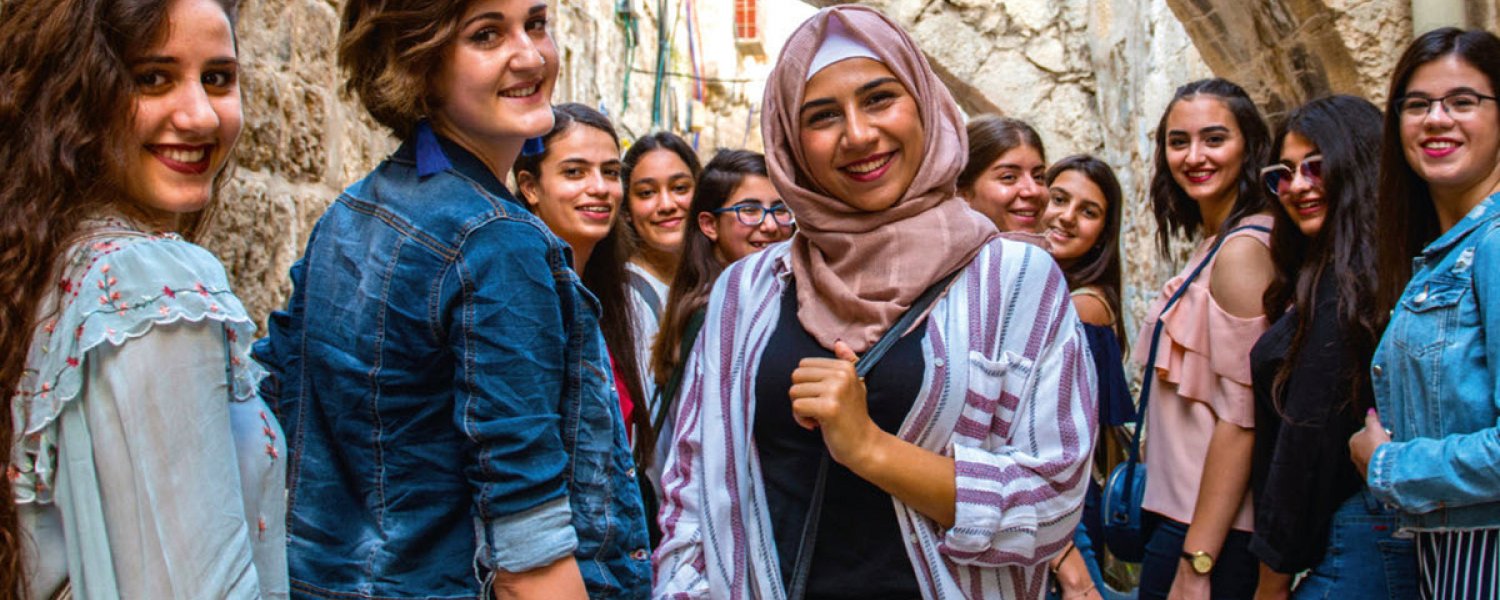For a group of talented young Jerusalemite musicians, the coronavirus pandemic lockdown was no obstacle to their doing what they have worked on together for years: singing and performing Palestinian Arabic music. Led by master conductor and composer Suhail Khoury, they ebulliently performed a recent composition, La Tahjuru [Do not emigrate], in perfect harmony and rhythm, with each young woman in her own home, recording on her cell phone. It comes together in a brilliant and uplifting new work from the group:

Credit:
Banat al-Quds
Lockdown Does Not Stop Banat al-Quds (Daughters of Jerusalem) from Making Their Voices Heard
Banat al-Quds (Daughters of Jerusalem), founded by Khoury in 2013, consists of a 22-member choir and a 13-member ensemble who practice and perform together weekly at the Jerusalem Society for Music Teaching and Research, which Khoury also directs. All 35 members are young Palestinian women from Jerusalem. Although the choir and ensemble were founded in 2013 to provide more opportunity to talented women at the conservatory who were specializing in Arabic music, many of the original members are still with it, attesting to their dedication.
The ensemble players, all students at the conservatory, play a variety of instruments including oud, qanun, string instruments (viola, cello, and contrabass), as well as the flute, clarinet, and percussion.
The choir singers are all volunteers who are selected through a rigorous audition process. At the beginning, all were teenagers in high school. Today, the ages are wider ranging: although most remained with the group, each year, one or two leave to pursue other opportunities, and new members replace them.
The exquisite performance of La Tahjuru, composed to commemorate the 72nd anniversary of the Nakba (Catastrophe), is the result of hard work: Khoury explained that a weekly three-hour rehearsal is mandatory for all members; those who do not attend reliably are not allowed to remain. Khoury also noted that “it took a lot of effort to train them, particularly because the issue of ‘voice harmony’ is not common in Arabic music.”
“Although it is a challenge,” he added, “there is a beauty in the volume of the group. The fact that they are a large group is quite special.” As is clear from the video shared here, the hard work has clearly paid off, and the harmony is now exceptional.
Vision, Style, and Themes
The original vision for the ensemble was to introduce new original Palestinian rhythms and styles, as well as to redistribute old songs by female Palestinian singers, including Zeinab Shaath, Rim Banna, Rima Tarazi, and others, and make them more widely known. At the same time, Khoury also encourages the creation of new folkloric/Palestinian songs.
The repertoire of songs selected has humanitarian and Palestinian national themes.
Khoury personally pours a lot of effort into the music, both composing (as is the case with La Tahjuru) and instrumentalizing, harmonizing, and arranging for the older songs that the group performs.
World Acclaim
The hard work has paid off in other ways, too: Over the years, the group has been able to travel to perform and compete internationally. They have performed in Jordan, Norway, Greece, and Dubai, where they won “Best Choir of the Middle East” at the ChoirFest Middle East 2016, which is an annual festival in Dubai celebrating the rich diversity of choral music in the region. View their award-winning performance here.
This past year, they were scheduled to travel to Norway to perform in collaboration with a Norwegian choir, but those plans had to be converted to a virtual collaboration due to the pandemic.
Khoury said the ensemble looks forward to resuming live concerts now that the pandemic has subsided.
Asked what his dream is for the ensemble, Khoury said, “It would be a dream to have Banat al-Quds perform in Gaza.”

